
We tested
„I use bee pollen because of its wide range of beneficial effects on health. And the great thing is that's 100% natural and doesn't burden my body with unnecessary chemical additives. “
Main product features
- flower pollen
- a source of vitamins, minerals, enzymes and other nutrients
- support of the immune and hormonal system
- can be consumed on its own or as part of desserts and smoothies
- for better nutrient digestibility, we recommend fermentation
- produced with respect for bees and the environment
When ordering over 79,41 €
Free shipping
Boost your vitality and overall health with bee pollen - the so-called "fountain of youth", a rich natural multivitamin. After fermentation in honey, you get a superfood full of vitamins, minerals, beneficial phytonutrients and enzymes.
By regularly consuming bee pollen you will boost your vitality and energy. Bee pollen also contributes to normal fertility and thinking. Due to its high micronutrient content, it benefits the normal function of the immune system.
Bee pollen is a rich gift of nature, sometimes referred to as the "fountain of youth." Bee pollen is said to be one of the most complex foods. Thanks to the richness and diversity of many wildflowers, our bee pollen is high quality, tasty and pure. It has been harvested in the most environmentally friendly way from unpolluted natural areas.
It is not for nothing that bee pollen is favoured by those who need to nourish their bodies or support beauty or hormonal health. This includes, for example, athletes or menopausal women.
It is particularly suitable to take:
- as a great source of nutrients
- for exhaustion
- also suitable for stressful times
- for maintaining normal prostate function
- to improve fertility
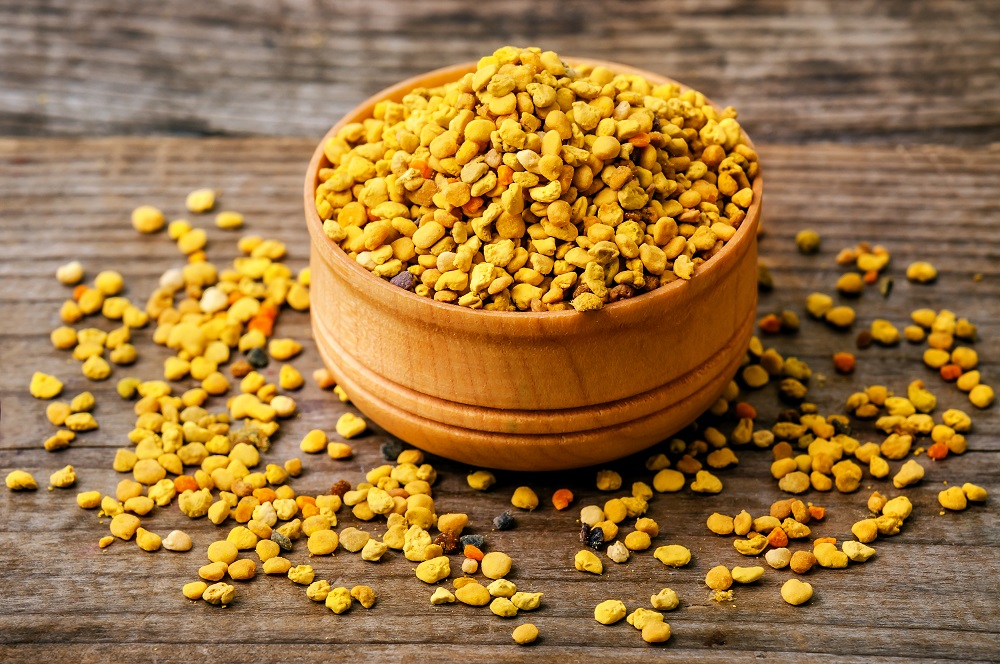
Which benefITS does IT contain?
Bee pollen contains more than 5000 enzymes and thousands of phytonutrients such as co-enzymes, bioflavonoids, phytosterols and carotenoids.
Due to its content of B vitamins
- Contributes to the normal functioning of the nervous system (B1, B2, B3, B6)
- Contributes to skin and mucous membrane health (B2, B3)
- contributes to the maintenance of normal vision (B2)
- contributes to the maintenance of a healthy energy metabolism (B1, B2, B3, B6)
- contributes to the reduction of fatigue and exhaustion (B2, B3, B6, B9)
- contributes to normal homocysteine metabolism (B9)
- contributes to normal blood formation (B9)
Due to its vitamin C and iron content
- Contributes to the normal function of the immune system (also thanks to vitamin B6)
- Contributes to normal collagen formation
Thanks to its vitamin E and C content
- has antioxidant effects, contributes to the protection of cells against oxidative stress
Thanks to its zinc content
- contributes to the maintenance of normal hair, nails and skin
- contributes to normal fertility and reproduction
- helps maintain healthy testosterone levels in the blood
Thanks to its calcium and magnesium content
- contributes to the maintenance of normal bones, teeth and muscle function
Where does it come from?
Our pollen comes from a small family bee farm in Buda, central Slovakia. The site is located in a picturesque landscape on the banks of the Hron River, near the protected landscape area. Our pollen therefore comes from a clean, unpolluted environment. It is collected and processed in a gentle way using handmade tools with respect for the bees.
Beekeeping has accompanied our suppliers for more than a century. The love of the craft has been handed down from father to son in the fourth generation.
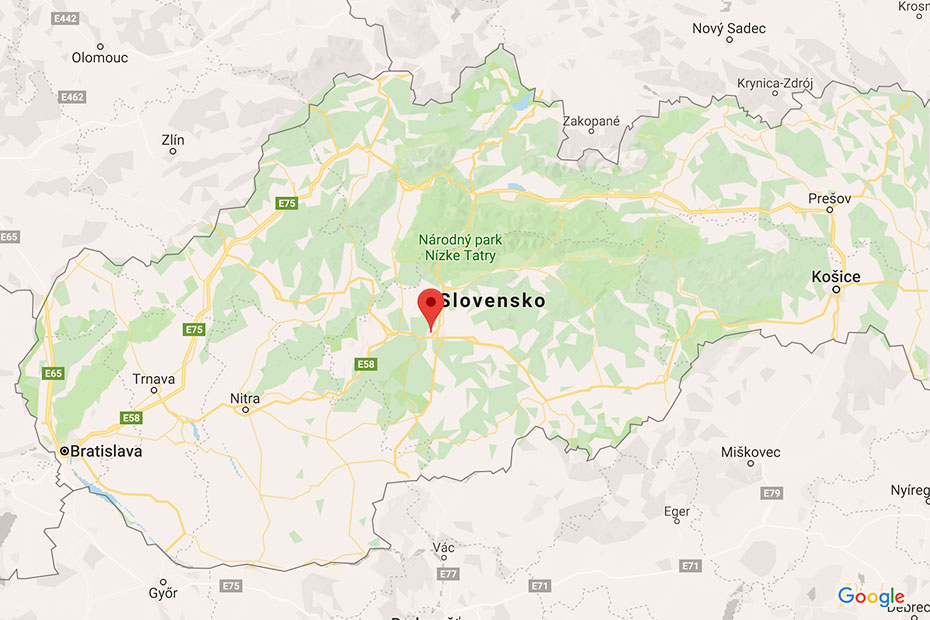 | 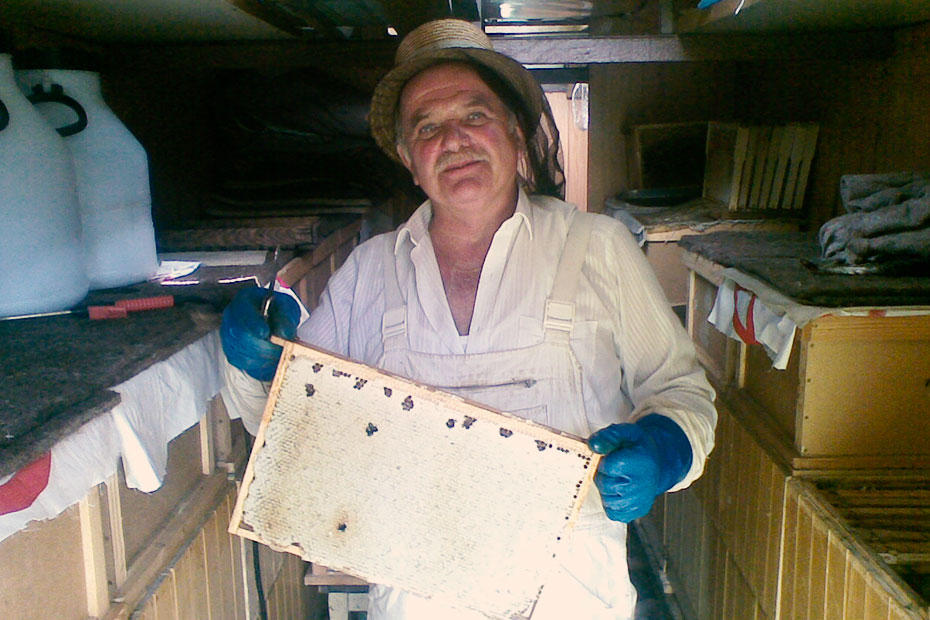 |
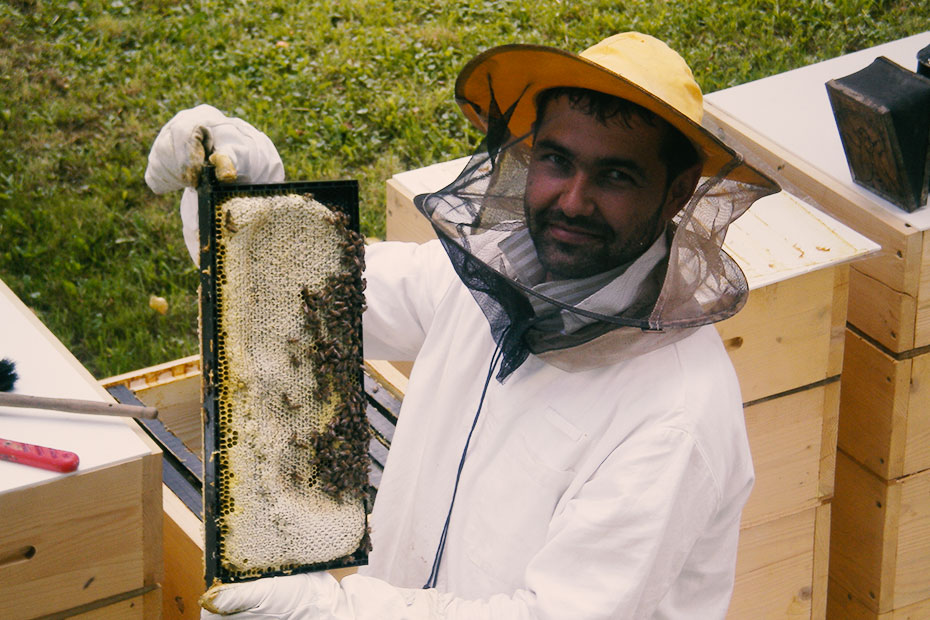 | 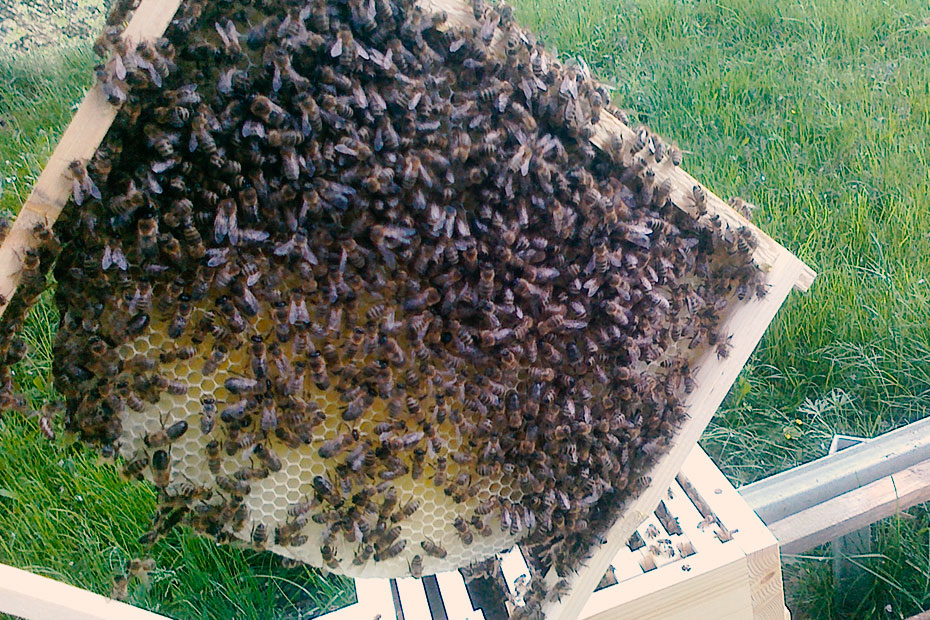 |
How is IT obtained?
Bees collect pollen grains from flowers on their travels. In one trip from the hive, they can visit more than 1,000 flowers! The golden pollen grains are microscopic in size, but the bees collect millions of them, then moisten them with honey and compress them into small balls.
The newest and highest quality technologies available are used to collect this pollen, with the intention of affecting the bees' lives as little as possible and preserving all the nutritional value and beneficial effects. The collection is carried out using grids placed at the entrance to the hive, through which the bee must pass, leaving 10 to 50 % of the pollen. However, never more than 30 % of the pollen is taken from the bees in this way, otherwise they would become weak.
This bee pollen is first frozen, then carefully dried at a temperature similar to that of a beehive, i.e. below 38 °C, and then cleaned. The pollen is dried slowly to stop the natural fermentation and deterioration of the pollen and to achieve the highest quality, purity and delicious rich taste of the pollen. By sensitive processing and careful storage, the pollen retains the nutritional richness that over-dried hard pollen loses.
Bee pollen and fermentation
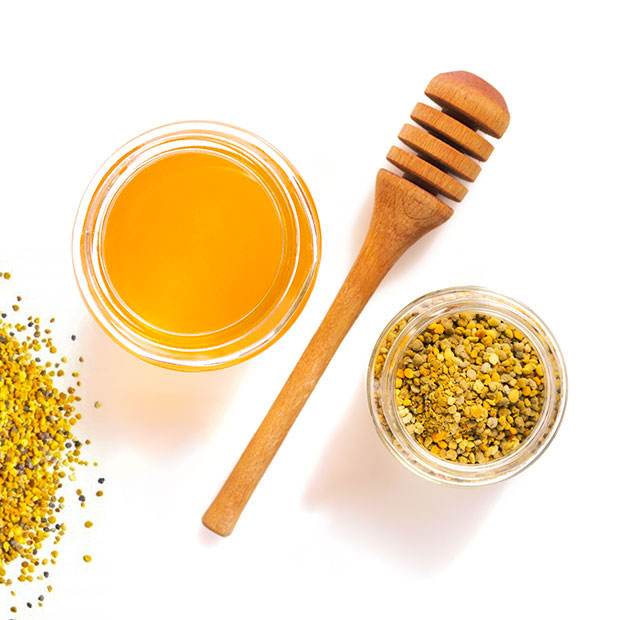 The bee pollen we offer here was collected before it was placed in the hive by the bees. Professionally, it is called royal pollen. We recommend fermenting it before consumption.
The bee pollen we offer here was collected before it was placed in the hive by the bees. Professionally, it is called royal pollen. We recommend fermenting it before consumption.
Fermentation is an enzymatic process that occurs naturally through the action of the pollen grains deposited in the hive. It significantly increases the digestibility of all nutrients.
However, there are several ways to ferment bee pollen:
If we want to ferment in a similar way to the hive, we need to use a hermetically sealed container with sufficient volume. After filling, 20 to 25 % of free space must be left above the pollen, which must be filled with honey and the container closed. The initial temperature should be kept between 28 and 32 °C (this is important to ensure that the process starts quickly and bacterial growth stops), after which it can be reduced to 20 °C.
Another way is to ferment less laboriously in honey. The following procedure has proved successful. Soak the pollen grains in water, but not too much so that the grains do not float in the water. Then add the wet pollen to the honey in a ratio of 1:4 and leave for 14 days. Store in a sealed jar in a dark place. Stir every 3 days during fermentation. The addition of water is important because otherwise the pollen grains will only preserve the honey, but the fermentation will not take place.
Pollen grains that are already fermented naturally in the hive are called honeycomb pollen. If you don't want to ferment it yourself at home, you can try naturally fermented pollen, which you can find here under the name Bee Pollen Fermented.
How to consume pollen
It can be used in cocktails or other drinks, in a variety of dishes, or you can just eat it by the spoonful as a snack. We recommend fermenting the pollen before consumption (see above) - this will increase its absorbability.
Product information
Ingredients: 100% bee pollen (unfermented)
Weight: 125 g
| Nutritional values | per 100g |
| Energy value | 1595 kJ / 379 kcal |
| Fats | 8,9 g |
| of which saturated | 3,1 g |
| Carbohydrates | 52 g |
| of which sugars | 31 g |
| Fibre | 5,3 g |
| Protein | 25 g |
| Salt** | 0,02 g |
| Calcium | 120 mg (15 %)* |
| Iron | 9.2 mg (65 %)* |
| Magnesium | 77.5 mg (20.6%)* |
| Vitamin B1 | 0.92 mg (83 %)* |
| Vitamin B2 | 0.54 mg (38 %)* |
| Vitamin B6 | 0.9 mg (64%)* |
| Vitamin C | 20 mg (25 %)* |
| Vitamin E | 3,2 mg (26 %)* |
| Niacin | 4.8 mg (30%)* |
| Folic acid | 0.3 mg (150%)* |
| Zinc | 6.5 mg (65%)* |
* Reference intake value
** Naturally occurring sodium
Warning: Some people may experience minor stomach and intestinal irritation and a laxative effect when taking bee pollen. Due to the richness of the nutrients, there is also the possibility of an allergic reaction to bee pollen (approximately 0.5 percent of all people). We therefore recommend an allergy test before use, by applying a small amount of bee pollen with honey to the wrist in the area where the pulse is felt. If a red spot appears after 3-5 hours, then you are most likely allergic to bee products and should not take bee pollen.
Contraindications. Bee pollen should not be taken by people with weakened kidneys and cancer (biologically active substances may promote tumor growth). It is also not suitable for people with pollen allergies.
Keep out of reach of children. Store in a cool, dark and dry place. Do not exceed the recommended daily dose. It is not a substitute for a varied diet. Not intended for children under 3 years of age, pregnant and lactating women.
Data sheet
| Form: | Granules |
| Country of Origin: | Slovakia |
| Raw: | Yes |
| Gluten-Free: | Yes |
Related articles and recipes
Radish salad with goji and bee pollen
Salad doesn't have to be green and not boring at all. In this recipe in two versions, we will show you how to experiment and brighten up the festive table with salad. White radish stands out for its juiciness and crunch, has antibacterial effects and improves digestion.
Kidneys – that´s what matters in the winter
Winter is already in full flow! This is how we perceive it from our western perspective now. But some time ago, we would opt for different words expressing aptly the peace of this season. Night took over, nature is getting quiet and slow, countryside is peaceful and cold; and everything is covered in shades of white and black. It´s the perfect time to contemplate and relax both your mind and body. If you make use of the winter to recover your strengths, in the spring the energy will await you instead of spring fever and you´ll be ready for the more active part of the year.
We can't share all information
about this product with you
Due to legislation, we can write very little about some products.
Our long-term customers know the products in depth and come back for them. We also encourage you to do your own research and make a conscious decision about what your body needs.

Jan Noah
Founder of Vitalvibe
- Estonia
Nutritional Yeast with B12, Flakes
- delicacy with the taste of cheese
- enriched with vitamins
- excellent for flavouring dishes
- Bulharsko
Bee Pollen Fermented
- fermented mixture of pollen and honey
- produced by wild bees
- boosts immunity and vitality
- China
Spirulina Organic, Powder
- source of a wide range of nutrients
- supports blood formation
- benefits heart and vascular health
- great support for detoxification and diets
- boosts phasic endurance and reduces fatigue
- China
- Peru
Cacao Nibs Criollo Organic
- cocoa berries
- without added sweeteners
- typical dark chocolate taste
- Indonesia, Peru
Cacao Nibs Criollo in Coconut Nectar Organic
- cocoa berries
- sweetened with natural sweetener
- excellent for replenishing energy
- Reviews (5)
Celkové hodnocení:
Úžasná chuť, doporučuji milovníkům včelích produktů.
Celkové hodnocení:
Beru opakovaně, měla jsem stejný produkut i od jiných prodejců, ale tento pyl je velice chutný. Beru na podporu imunity, dá se přidat i do svačinek, hlavně když děti nepozřou samostatně. Opravdu je cítit bio kvalita.
Přidávám ho do kakaa, jogurtu, nebo si ho dám jen tak na lžičku. Dobrá a zdravá zásoba energie a vitality.
Celkové hodnocení:
Zabralo nam to pri nachladeni, 1x denne do caju.
Pri potreti kutika na pere zmizol kutik do par hodin.
Selection of questions from Counselling
You can ask a question here and our experts will try to answer it.
Miriam Stelariia :) 27. September 2021
Krásný den, koupila jsem si Včelí pyl, kde je zmínka o fermentaci v medu. Jestli tomu dobře rozumím, je třeba pyl naložit do medu a nechat dní a poté užívat dle doporučeného dávkování? Děkuji a krásný den přeji
Ing. Petra Vašková odpověděl:
product specialist, holistic nutrition consultant
Dobrý den, paní Miriam,
ano, dle našich osobních zkušeností postačí menší poměr 1:4 - tzn. 1 lžíce pylu:4 lžíce medu. Uchovávejte v uzavřené sklenici, bez přístupu světla, promíchejte jednou za tři dny a cca za dva týdny máte pyl nafermentovaný.
V případě dalších dotazů jsem pro Vás k dispozici na 732 690 885 nebo petra.v@vitalvibe.cz.
Přeji krásný den,
s pozdravem,
Petra
Marie 11. August 2021
Dobrý den, ráda bych se zeptala na pár upřesňujících informací o fermentaci včelího pylu. Poměr 1:10 je jeden díl namočeného medu na 10 dílů medu? A sklenice je zavřená víčkem nebo něčím prodyšným (ubrouskem, kapesníčkem)? Fermentuje se celých 14 dní při pokojové teplotě? Moc děkuji! Marie
Ing. Petra Vašková odpověděl:
product specialist, holistic nutrition consultant
Dobrý den, paní Marie,
stačí i menší poměr - například mezi námi zaměstnanci nám funguje již poměr 1:4 - 1 lžíce pylu:4 lžíce medu. Dejte jej do plně uzavřené sklenice, uchovávejte např. ve skříňce (bez světla) a promíchávejte jednou za tři dny. Zhruba za 14 dní je pyl nafermentovaný :-)
V případě dalších dotazů jsem pro Vás k dispozici na 732 690 885 nebo petra.v@vitalvibe.cz.
Přeji krásný den,
s pozdravem,
Petra
Klara 5. April 2020
Dobry den, na baleni vaseho vceliho pylu se pise, ze 'pred konzumaci je treba pyl fermentovat 14 dni v medu.' Muzete mi k tomu prosim rict vic, jak mam fementovat (jaky pomer voda/med) a take zda-li je to nutne? Neni tedy radno konzumovat tak jak to je v sacku? Dekuji predem za odpoved a preji pevne nervy a zdravi v teto nelehke dobe. S pozdravem Klara
Ing. Petra Vašková odpověděl:
product specialist, holistic nutrition consultant
Dobry den, Kláry,
fermentace není nezbytně nutná, takže včelí pyl klidně konzumujte jen tak :-) Během procesu fermentace se však zvyšuje stravitelnost všech živin, roste využitelný obsah určitých vitaminů, proto ji doporučujeme. Návod na fermentaci naleznete přímo na našich stránkách :https://www.vitalvibe.eu/cs/super-potraviny/41-vceli-pyl-bio.html?search_query_product=v%C4%8Del%C3%AD
Přeji Vám také hodně zdraví,
s pozdravem,
Petra (petra.v@vitalvibe.cz)
Lenka Housová 25. March 2020
Jak na fermentaci? V magazínu jsem nenašla postup. Děkuji za odpověď.
Ing. Petra Vašková odpověděl:
product specialist, holistic nutrition consultant
Dobrý den, paní Housová,
fermentace je popsána přímo v detailu produktu, nicméně pro jistotu napíšu.
Je potřeba použít hermeticky uzavíratelnou nádobu s dostatečným objemem. Po naplnění musí nad pylem zůstat 20 až 25 % volného prostoru, který doplníme medem a nádobu uzavřeme. Počáteční teplotu je třeba udržovat mezi 28 až 32°C (to je důležité kvůli rychlému nastartování procesů a zastavení růstu bakterií), poté ji lze snížit na 20°C.
Další ze způsobů je méně náročné fermentování v medu. Osvědčil se postup následující. Pylová zrna namočit do vody, ale ne moc, aby zrna ve vodě neplavala. Poté přidat mokrý pyl do medu v poměru 1:10 a nechat 14 dní odležet. V průběhu fermentace třikrát promíchat. Přidání vody je důležité, protože jinak se pylová zrna jen zakonzervují do medu, ale neproběhne fermentace.
Přeji pěkný den,
s pozdravem,
Petra (petra.v@vitalvibe.cz)
Libor Slanina 9. June 2015
Dobrý den,jaká je vstřebatelnost/využitelnost/včelího pylu lidským organismem?Není třeba před konzumací nějakého procesu,který umožní tělu plně využít látky obsažené ve včelím pylu?
Děkuji.
Slanina
Michaela Ptáčková odpověděl:
Krásný den, pane Slanino, včelí pyl je nejlépe vstřebatelný, pokud ho přidáte do kvalitního (tepelně neupraveného) medu v poměru 1:10 a necháte zavřené fermentovat 1-2 týdny, sklenici párkrát převrátíme, aby se pyl s medem dobře promíchal.
- Bulharsko
Bee Pollen Fermented
- fermented mixture of pollen and honey
- produced by wild bees
- boosts immunity and vitality
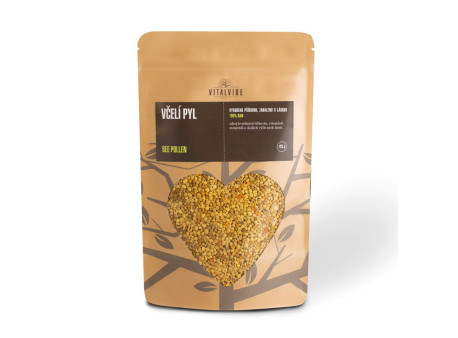











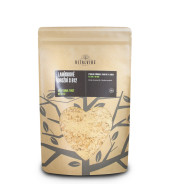
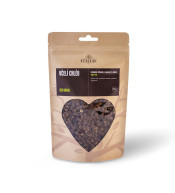
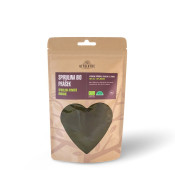
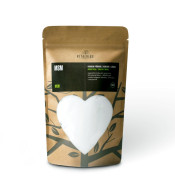
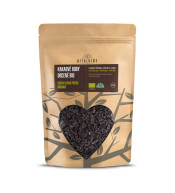
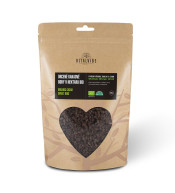
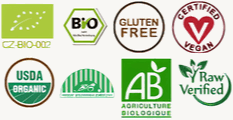

Celkové hodnocení:
Moje první zkušenost s Včelím pylem, asi dobrá